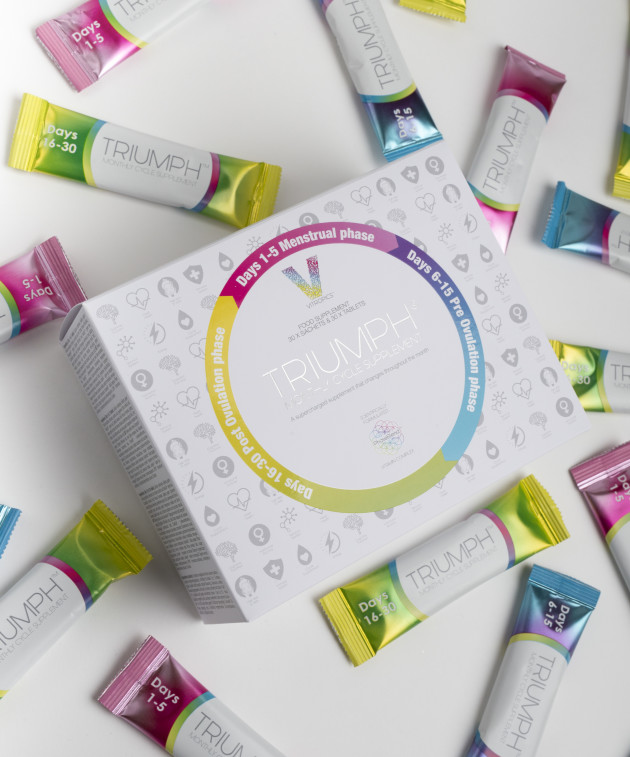
Cramps, fatigue, bloating: Coping with PMS during the lockdown
For many of us, our emotions are all over the place right now. Tempers may be tested; nerves may be frayed, and anxiety may be at an all-time high. Add that to the hormonal ups and downs of PMS, and things just gotten ten times harder.
Being cooped up at home, with limited access to some of the things we love the most can make it feel like… a recipe for menstrual disaster! Maybe alone time is your go-to and you struggle to find a quiet moment these days. Maybe a coffee and rant date with your best friends is your cure-all solution and that is on pause right now. Either way, the PMS struggle might be very real for many of us right now.
So how do we get our power back and take control of our PMS?
Vitropics believe in the power that comes with knowing your body and your cycle. This period of self-isolation can be a good opportunity to get in tune with your body. What does it like? What doesn’t it like? What foods have an impact? Does exercise help? When do you feel your most emotional? By learning the factors that can make your symptoms better or worse, you can help better manage PMS.

But…what Is PMS?
Cramps, bloating, cravings, mood swings, fatigue…If you are nodding along to any of this right now, welcome to the PMS club! A staggering 90% of women report PMS symptoms at some stage during their menstrual cycle, every single month and yet, there is still so little information and research out there about it. What we do know is that Premenstrual Syndrome (PMS) refers to the wide range of physical, behavioural and physiological symptoms that are experienced during the lead up to a monthly period.
Sounds grim, doesn’t it? But fear not. We're going to arm you with the tips you need to help manage some of the most common PMS symptoms.
Tip Tops to manage some of your PMS symptoms
Coping with … Bloating
The bloat arrives and, with it, comes an increased desire to wear pajama bottoms 98% of the time. Sounding familiar?
But what causes this unwelcome monthly bloat? You guessed it- most likely those pesky hormones! High levels of estrogen can cause our bodies to retain water and high levels in progesterone can make for a slower digestive tract, which also may not help symptoms of bloating or fullness.
To help ease the bloat:
- Avoid foods that cause gas e.g. broccoli & sprouts
- Limit foods high in sugar & salt- as they promote water retention
- Cut back on caffeine, alcohol and carbonated drinks as they can dehydrate the body
- Get your recommended 7-9 hours of shut eye each night- this is when excess fluids are eliminated by the body
- Stay hydrated – this prevents your body from retaining water
Coping with… Cramps
Just like with all PMS symptoms, cramps can be experienced differently for each person.
For some, they are centered predominantly in the abdomen, for others it comes in the form of back pain and for others, it really does feel like a fat man is sitting on their uterus. Cramps are caused by chemicals produced in the uterus called prostaglandins. These chemicals cause the uterus to tighten and relax, causing cramps.
To help ease your period pain:
- Use a heating pad or hot water bottle on your lower abdomen
- Treat yourself to a warm bath
- Stretch it out with some light yoga or meditation. We love this session by Yoga with Adriene
- Get some exercise! The body’s natural endorphins are known to not only boost your mood but also have a pain-relieving effect. A well-known way to boost your endorphins is aerobic exercise, having an orgasm is another…
Coping with…Mood Swings
Screaming kids? Disrupted schedule? Lack of “me-time”? Have we touched a nerve yet?
PMS or no PMS, there’s no denying that this period of self-isolation is challenging on all our moods. We’re up and then we are down. We’re laughing and then we are crying. To avoid a meltdown or complete stand-off with a loved one, you need to get honest. Talk with your isolation buddy, discuss how you feel, share your triggers and explain your needs.
Maybe it’s more me-time, more quiet time or simply more time to rant. Stress can have a big impact on our mood and for many, PMS can actually make you more prone to feeling stress.
Since your overall stress levels can affect the intensity of your PMS symptoms, de-stressing throughout your menstrual cycle is key. Mindfulness, journaling, therapy, and exercise are all great ways to reduce stress as well as dietary changes, like reducing caffeine and eating more omega-3 fats. You might also want to check if you are deficient in any key vitamins such as B6, Calcium or Magnesium which have been tied to easing PMS symptoms.
Coping with… Cravings
Many of us may be living off a menu of “Whatever was left on the supermarket shelf” or “Whatever my PMS tells me to eat” but it’s important to consider what is going into your body and how it’s making you feel. Sugar cravings are very common during PMS. And it makes sense. If we have low serotonin, we will seek out substances that raise serotonin levels. Foods high in sugar are a way for us to do this.
We are not here to tear you away from that beloved slice of pizza or the secret stash of chocolate. Eat it and enjoy it girl! What we ARE saying, is to remember to also feed your body with some other food, like with vitamins and stuff! Eating well during your period means staying hydrated and lots of iron-rich foods- be that red meat or spinach to compensate for the natural iron you are losing as you bleed. Alongside this you should also consider keeping up a steady intake of magnesium and vitamin D-rich foods such as bananas, salmon, nuts, seeds, eggs and dark chocolate which can help with relaxing your muscles.
Coping with… Fatigue
We’re just gonna say it like it is … periods are bloody exhausting! It's one of the great ironies of menstruation that the same thing that makes you so tired during the day can make it tough to sleep at night.Lest you think you're alone in your sleepless period nights, the National Sleep Foundation found that over 33% of women report disrupted sleep in the week leading up to their periods.
Fatigue before a period is thought to be linked to a lack of serotonin- a brain chemical that is known to affect your mood. Before your period starts each month, your serotonin levels may fluctuate significantly. This fluctuation can lead to a major dip in your energy levels, which can also affect your mood.
Our bodies are going through a lot and need rest more than ever. During the lead up to your period, getting a solid 7-9 hours of shut-eye is crucial each night to feel restored and recharged.
We are seeing a lot of content out there promoting “getting things done”. Sometimes we just need rest. This could be in the form of meditation or reading a book or it could be wrapping yourself in a giant blanket with a Netflix marathon. You do you!
Ultimately- be kind to yourself, get some rest- the hustle can wait.
Coping with…. PMS and Kids
One thing we know with absolute certainty is that PMS and children are no match made in heaven. And when this collides with a period of self-isolation, let's just say- things get interesting…There is no fix-all guide to navigating this strange time but here are a few tips that can make things a little bit more manageable:
Create a new timetable or routine for the whole family – get them involved in planning it so they feel included and not just being told what to do
Consider batch cooking so you don’t have to cook every day
Allocate a quick family tidy-up time in the evenings so you don’t wake-up and come down to a mess in the morning
Get the family involved with cleaning and having set chores to do like hoovering, helping to sort their own laundry, emptying the dishwasher or walking the dog
Me-time is more important than ever before. Allocate a few minutes to yourself for a podcast and some meditation/mindfulness as much as possible.
Lastly, remember- PMS can feel so much worse when you are overwhelmed. Give yourself a break, a pat on the back
Meet The Yin To Your PMS Yang
You don’t have to go through PMS or those dreaded symptoms alone. Monthly cycle supplement, Triumph has your back!
Taken daily, starting on day 1 of your period, Triumph delivers support for your body, when it needs it most. We are talking – support for your hormonal activity, energy levels, immune system, heart health, cognitive function as well as for your hair, skin & nails.
Periods. Just. got. Easier!
Triumph® Monthly Cycle Supplement by Vitropics are available to purchase online at www.vitropics.com for RRP €44.99 per month. They are also offering a monthly cycle auto-delivery service for €40.35 which comes with a free water bottle in your first order.






